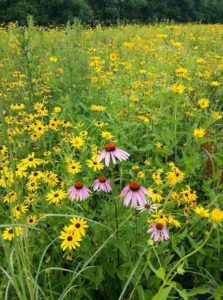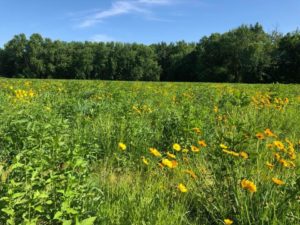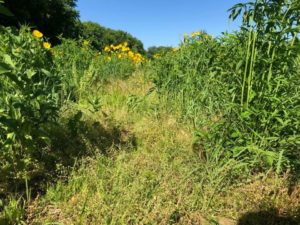
In the Field: National Pollinator Week
June 18-24 has been named National Pollinator Week!

Photo by Dan Potter, Baltimore Township Pheasant Cooperative
As we know, pollinators are vital to the success of our ecosystem but have faced challenges due to changing use of the landscape. Fields are getting larger, fence rows are disappearing and floral diversity is being eliminated with diminishing grasslands.
We face the same glaring concerns for upland birds.
The good news: it’s not too late to act. People are recognizing not only that something can be done, but that their effort is essential. The pollinator movement has become a hot topic because of its multiple benefits. If I told you that by planting and managing grassland fields you could aid in the survival of not only pollinators but other insects, songbirds, upland game birds, small game and fawns…would you do it? What about the value added by improved water quality, less soil erosion and more opportunity for recreation such as hunting…would you be more intrigued?

Photo by Chad Thelen
The other good news: 40,000 acres has been allocated for the Southern Michigan Pheasant and Monarch Recovery Program through USDA’s Conservation Reserve Program (CRP) State Acres for Wildlife Enhancement (SAFE). Until August 17, 2018 landowners in the 41 eligible counties can apply for funding to implement grassland habitat.
If you are interested in this program please contact your local USDA Service Center.
With the goal of quantifying habitat impacts in Michigan of managed grasslands, The Michigan Wildlife Cooperatives Program in partnership with the National Wildlife Federation has created a small habitat designation program. The program hopes to collect information from habitat managers so we can showcase the positive impact those areas are having in Michigan for pollinators.
The program criteria and designation process is simple and if accepted you will receive a Pollinator Habitat Designation sticker that can be placed on a cooperative sign, habitat sign or car window.

Photo by Chad Thelen
Michigan Wildlife Cooperatives work to enhance the working relationships between landowners and hunters with similar wildlife management goals. As the Cooperative Coordinator, I encourage you to reach out to your neighbors and talk to them about this information. If you are interested, they might be too.
One seed can grow a plant that will flourish; how many will that plant feed? Imagine what we can achieve when communities come together with a common goal. You are that one seed. Plant the idea of conservation in yourself and others. Show with action, not just with words. Collaborative conservation is the difference between making a change and hoping for a change to be made.
For information about what a wildlife cooperative is, how to start a cooperative or how to join one, please email me at mwarda@mucc.org, calling 517-346-6454 or visit https://mucc.org/cooperatives/.

I am on the Board of Directors for Camp Lael, in Lapeer. We are seeking to expand our programming and camp purpose. Would this be a good program for us to take up, for use with upper elementary children and high school adolescents? Do you have another conservation program we’d be able to use?
Hi Jacqueline, there were a few different programs mentioned here. Do you mind emailing me at mwarda@mucc.org? I think there are a few different routes that would be great for you depending on future goals with the camp. Thanks!